Photo courtesy of Marist College Archives and Special Collections
The Brain Behind the “Boys”
Leading the “Boys in the Boat” to gold at the 1936 Berlin Olympics was just the beginning for Al Ulbrickson, who quietly became one of the greatest collegiate rowing coaches of all time
Photo courtesy of Marist College Archives and Special Collections
While conducting the exhaustive research behind “The Boys in the Boat,” his absorbing account of the hardscrabble 1936 University of Washington crew that won gold at the Berlin Olympiad, author Daniel James Brown found one of the characters in his story most elusive to render in flesh and blood: the team’s enigmatic young coach, Al Ulbrickson (BA 1926).
“Ulbrickson was a challenging character to bring to life,” admits Brown, more than a decade after the publication of his bestseller. “It was, in part, because he was very reticent with his crews and with the sportswriters. He didn’t like to tip his hand.”
Those sportswriters took to calling Ulbrickson the “Dour Dane,” owing to his Nordic heritage and often solemn expression—plus their own chagrin from quotidian efforts to draw blood from a stone. Ulbrickson said little and revealed even less.
The archetypal “strong, silent type” was not one to heap praise or seek the limelight. His newspaper coverage mined no profound insights. His meticulous practice logs divulged few personal thoughts or feelings. He left no journals or papers articulating philosophy or expressing principles. Even his grandchildren confirm that his reticence was a defining feature.
Perhaps that’s why Ulbrickson, who ruled the sport for decades after that celebrated season and regularly transformed Husky boats into undeniable juggernauts, cuts such a fascinating figure even today.
What he did is easy to describe. How he did it is another story.
Born to the water
Alvin M. Ulbrickson was born in 1903 in Seattle’s Montlake neighborhood, just a stone’s throw from the ASUW Shell House that would one day become his dominion. He grew up in a small farmhouse on Mercer Island, back when it was a more rustic and less fashionable address.
With no bridge connecting to the mainland, Ulbrickson had to row two miles across the lake every day to attend Franklin High School.
His dedication paid off. At the UW, he excelled in the classroom, earning a Phi Beta Kappa key for his performance at the UW College of Business Administration (as the Foster School was known in those days). He also honed his rowing prowess, stroking the Husky varsity eight to national championships in 1924 and 1926.
As a star oarsman in the heyday of the sport, Ulbrickson’s celebrity was by then so pronounced that his courthouse marriage to Hazel Stehling ahead of that final year caused a stir across Seattle. “There was much speculation at the time that he wouldn’t return for his senior season,” says his grandson, Al Ulbrickson III.
But that was never a real possibility. Ulbrickson was a fierce competitor, Hazel supported his dreams, and he always came back to the water.
After his decorated collegiate rowing career, head coach Rusty Callow hired his former captain to lead the Husky freshman team in 1926. Two years later, when Callow decamped for the University of Pennsylvania, he saw to it that Ulbrickson would take his place at the helm of the Husky armada.
The boss, and all business
In those days, crew was king in Seattle, with its depth of maritime heritage and dearth of professional sports. The UW teams had become a steady spring of pride for residents of this inland isthmus, nearly surrounded by waters. Regattas drew tens of thousands of fans, lining the course on shore, in boats and in traveling rail-car bleachers.
Coaching Husky crew was a big deal.
Ulbrickson was just 24 when he took over the program, scarcely older than the rowers he was called to lead. And scarcely equipped to manage the reporters that swarmed the program like pen-wielding paparazzi.
So, he made a habit of turning out at practice sessions in a business suit, necktie and a fedora. His natural poker face grew even more inscrutable. And he set an uncompromising standard from the start. No swearing, no smoking, no drinking was permitted. Solid academic standing needed to be maintained. And the team always came first.
“Because there was not much of an age gap between him and these kids he was coaching, Ulbrickson had to put on a stern, formidable exterior in order to command their respect,” Brown says. “He wanted to convey the sense that he was the boss, and he was all business.”
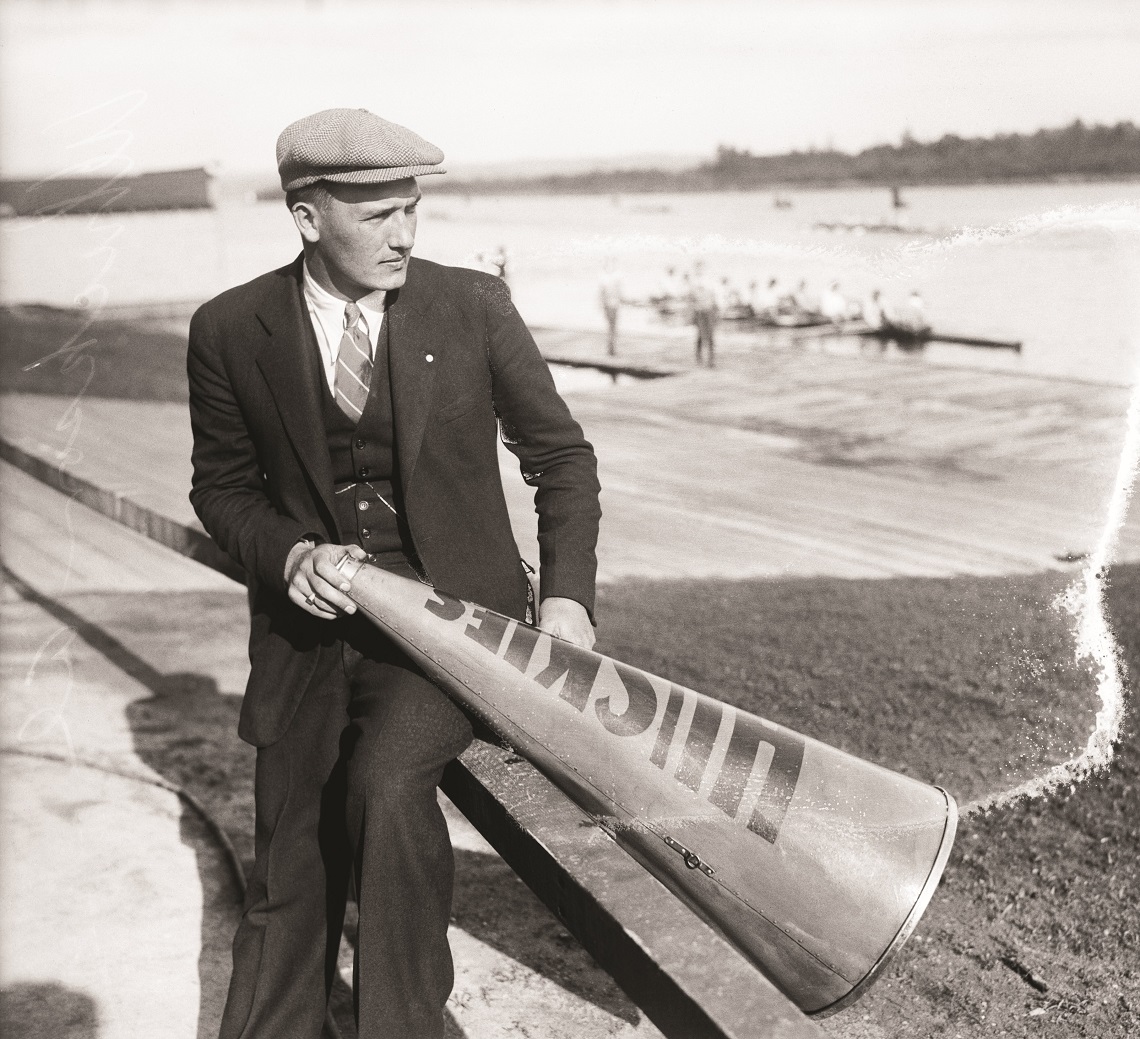
His taciturn nature also kept the pressmen guessing. Ulbrickson became an endless source of intrigue to the legendary Royal Brougham of the Seattle Post-Intelligencer and George Varnell of the rival Times, whose grandiloquent daily reportage would later constitute the raw materials for Brown’s opus.
At the time, those column inches turned the Dour Dane into a genuine local luminary. “The Times and P-I embraced the sport because the Seattle community wanted them to embrace it,” says Eric Cohen (BA 1982), a former Husky coxswain and long-time program historian. “Ulbrickson became larger than life.”
Old-school attitude, modern methods
When he did speak, people listened. The direction he gave tended to be blunt and precise, at least to his rowers if not the press. “Ulbrickson created environments that were highly competitive,” Cohen adds. “He knew what he wanted his young men to achieve.”
Though his demanding style might have been considered “old school” even back then, some of Ulbrickson’s methods could be considered quite modern.
He surrounded himself with an expert support system, including trusted classmate Tom Bolles, brought on to coach the frosh team (before later leaving to coach at Harvard). Most notably, perhaps, Ulbrickson formed a long and profitable partnership with the venerable boat builder and rowing philosopher, George Yeomans Pocock. The two formed a rather odd couple. And they were not personally close, according to Brown. “They had very different styles,” he explains. “Ulbrickson was stern, reticent, demanding and could be very gruff with the guys. Pocock had a more benign, encouraging approach. So, he was sort of the good cop to Ulbrickson’s bad cop.”
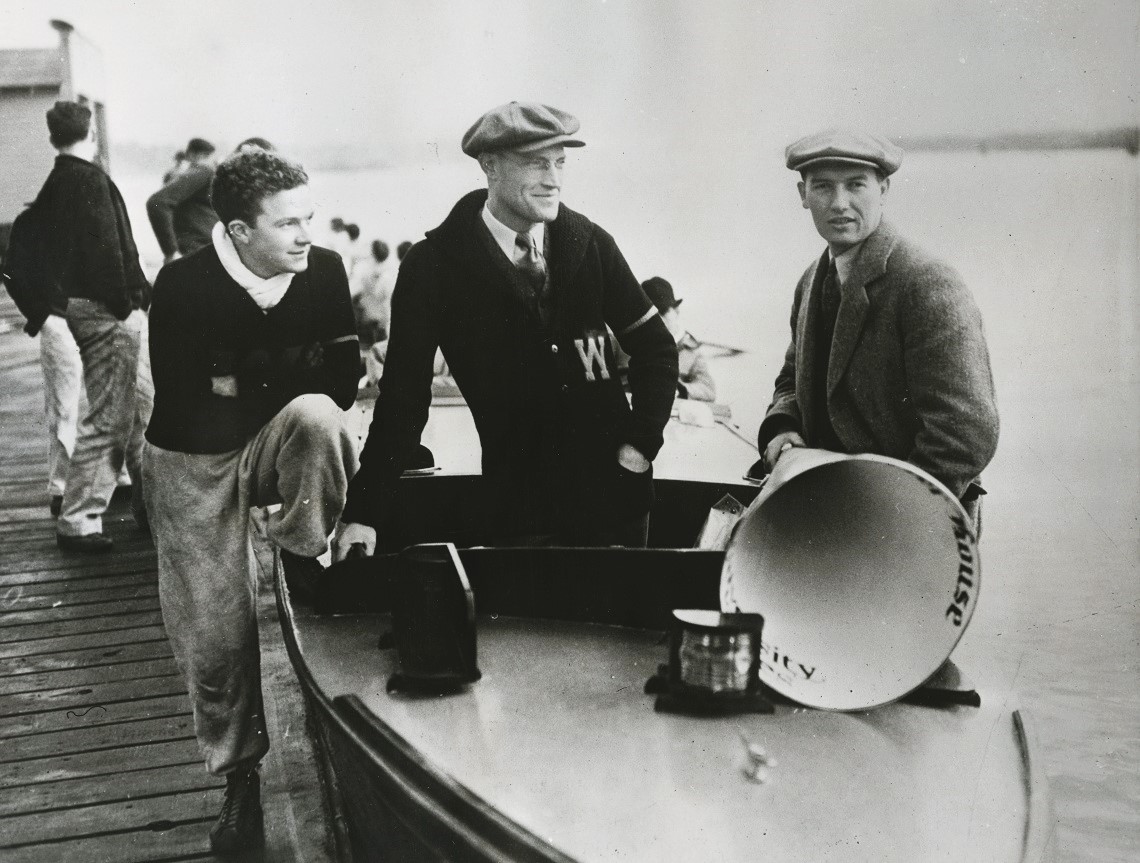
Beyond personnel dynamics, Ulbrickson was ahead of his time in other ways. During days in the launch without a word for his crews, Cohen says, “he would observe and observe and observe.”
He logged detailed observations on every training session in chemistry lab books, tracking and analyzing performance data as an alternative to decision-making from the gut. He stressed the importance of nutrition. Obsessed over stroke rates—his grandson inherited his extensive collection of stopwatches—and the nuance of technique.
And he tinkered like an alchemist with lineups.
Michael Callahan, the current head coach of Husky men’s rowing, commends Ulbrickson’s balanced approach now that coaching has tipped from instinctive to empirical. “In our sport, people want everything to be scientific,” he says. “I see it as more like architecture. There’s art and there’s engineering. And if you have both, it creates a beautiful structure.”
The analog, in rowing, is called “swing,” the synchronized movement of bodies and blades that generates speed on the water. And Ulbrickson’s boys were fast.
Washington vs. the world
But not so much in the beginning. In the early years of Ulbrickson’s coaching tenure, Washington struggled, especially against its West Coast archrival, the University of California at Berkeley, and its outstanding coach Ky Ebright, who had trained as a coxswain under the original Husky rowing innovator, Hiram Conibear. Ulbrickson had to watch Ebright lead Cal to Olympic gold medals in 1928 and 1932. Besting the best in the world became his mission. “There was never a moment that my grandfather wasn’t thinking about how he was going to beat Cal,” notes Al Ulbrickson III.
As the next Olympic games loomed on the horizon, Ulbrickson began to feel some existential pressure. Keeping his job at Washington might require a grand international success.
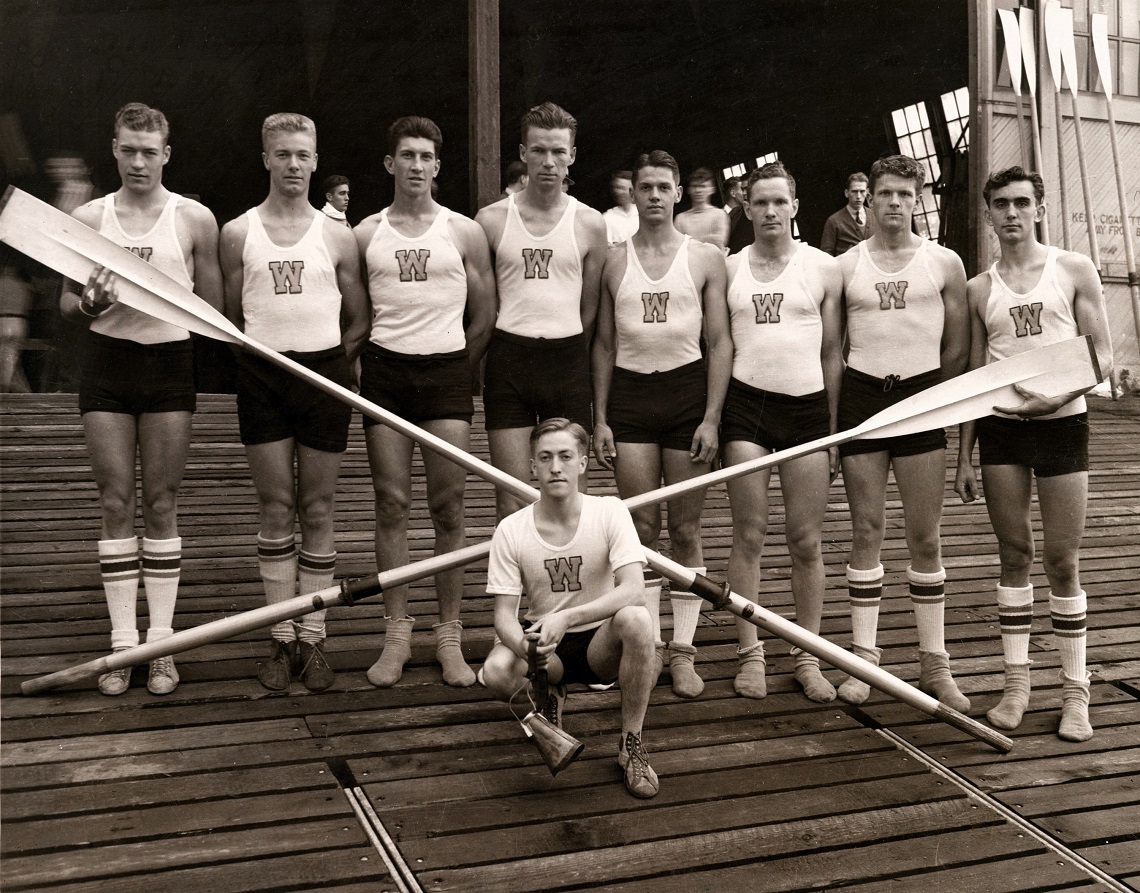
Fortunately, a promising group of freshmen turned out in 1933—if only he could conjure the best in them. “After several disappointing years, Ulbrickson realized he was going to need more than just strong bodies,” Cohen says. “He would need personalities that could mesh together, become greater than the sum of their parts.”
You’ll find no more stirring account of this extraordinary group’s multi-year drive to Olympic gold than the words of Brown in “The Boys in the Boat.”
In the Cliffs Notes version, a team of working-class kids from the mill towns and farmlands of Washington finally beat Cal in the west, became the first team to sweep the Intercollegiate Rowing Association (IRA) national championship, outlasted Cal and all comers at the Olympic trials, then edged the powerhouse British, Italians and Germans—while Adolph Hitler and his inner circle watched on—to win the gold medal in Berlin.
“As George Pocock would say, it’s not enough for the muscles of a crew to row together. Their hearts and minds must also be as one,” says Cohen. “That’s what Al Ulbrickson found in 1936: something that reached beyond the physical.”
As Brown writes, the victory rendered Ulbrickson even more speechless than usual. But a United Press International reporter caught an unusually emotional coach racing to congratulate his young men, proclaiming them “the finest I ever saw seated in a shell. And I’ve seen some corking boatloads.”
More “corking boatloads”
Berlin culminated years of dogged preparation, endless observation, obsessive attention to detail and quiet motivation. But it was also just the start of an era of Washington naval supremacy.
Ulbrickson’s granddaughter, Rinda Ulbrickson, recalls being aware of the 1936 crew long before it became a national phenomenon thanks to Brown’s writing a decade ago. But she says her grandfather never dwelled on the achievement. “Because that was just a small part of his career,” she says. “He had such a fond recollection of all the men who came through the program. It was fantastic to see the ’36 crew get so much acclaim, but it kind of overshadows some of the other stunning achievements at the UW.”
Ulbrickson led the Huskies to six national titles in the varsity eight (and 10 in the JV eight) in 23 trips to the IRAs, sweeping the regatta on four occasions. His teams defeated Cal in 20 of 28 varsity duels. And he led fours to Olympic gold in London 1948 and bronze in Helsinki 1952 (with his son, Al Ulbrickson Jr., in the latter).
Cohen counts the teams of 1940, 1941 and 1948 among the greatest in school history.
And then there was 1958, a cracking bookend to Ulbrickson’s early career adventure in Nazi Germany.
One last row for glory
A rules violation by the Husky football program resulted in a post-season ban extending to all sports that year, grounding Ulbrickson’s promising crew team from contending for a national title. The now-veteran coach felt for his young men. He pledged that, if they finished the season undefeated, he’d take them to the prestigious Henley Royal Regatta in England, where the best in the world tested their mettle.
The Huskies did just that. And Ulbrickson was true to his word, with significant financial assistance from the people of Seattle, who took up the team as a cause célèbre.
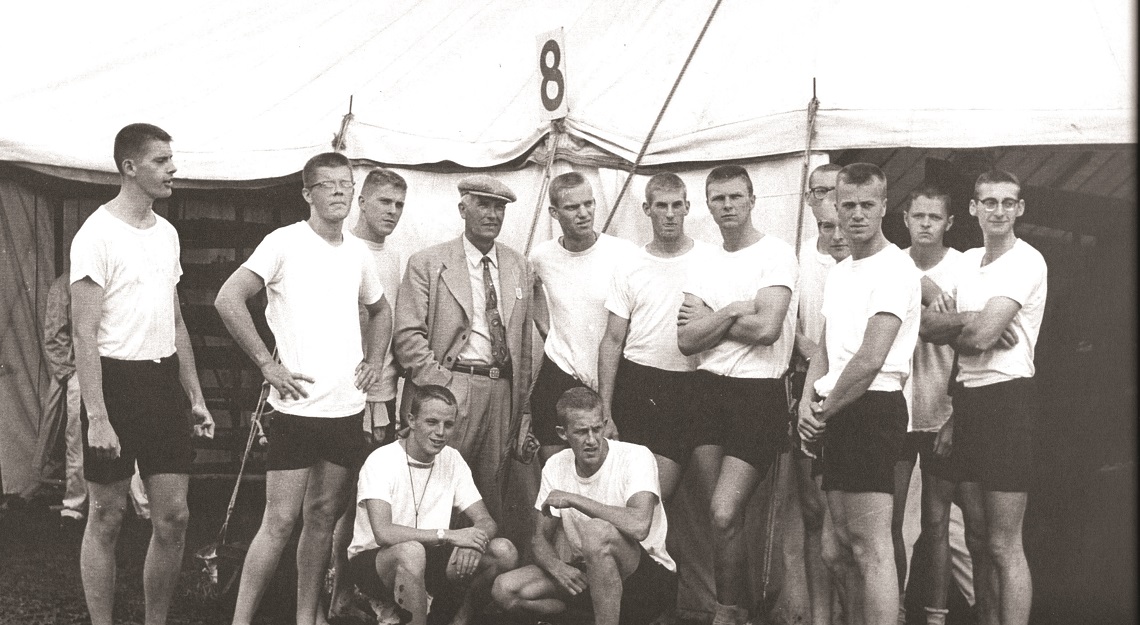
In the first round of single-elimination match racing, the Husky eight drew the hulking national champions from the Trud Rowing Club of Leningrad, who defeated the college men soundly.
But that was not the end of the story. Behind the scenes, the U.S. State Department and Senators Magnuson and Jackson brokered a goodwill rematch in Moscow, the epicenter of the Soviet Union at the height of the Cold War. The Huskies would be the first American athletes to compete behind the Iron Curtain.
In the two-week buildup, Ulbrickson did what he could to focus his rowers on the task at hand rather than the geopolitical ramifications surrounding the first clash of USA vs. USSR. On race day, another Husky eight (this one powered by four Foster students) became legend, seizing the lead from the start and pulling away to avenge its loss at Henley.
Cohen calls it “one of the most incredible wins in the history of rowing, not just at Washington.”
It was also the final race of Ulbrickson’s career. Feeling “emotionally bankrupt” after the dramatic past season, he retired—quietly—at the start of the 1959 campaign. “I’m deeply appreciative of the confidence and the trust the University has placed in me through the years,” he wrote. “This goes double for the thousands of parents who have allowed, and encouraged, their sons to row, and to those same sons who made our rowing so successful.”
Humility and hard work
Those sons had plenty to say about him. At his retirement celebration, one wrote: “With your uncompromising way of life as an example, your honest urging to ‘give the best that’s in us,’ stressing the need for teamwork… this lasts much longer and sinks much deeper into the lives of the men you have touched. Perhaps our practice of these values is the greatest tribute we can give.”
After leaving the spotlight, Ulbrickson was never tempted to return.
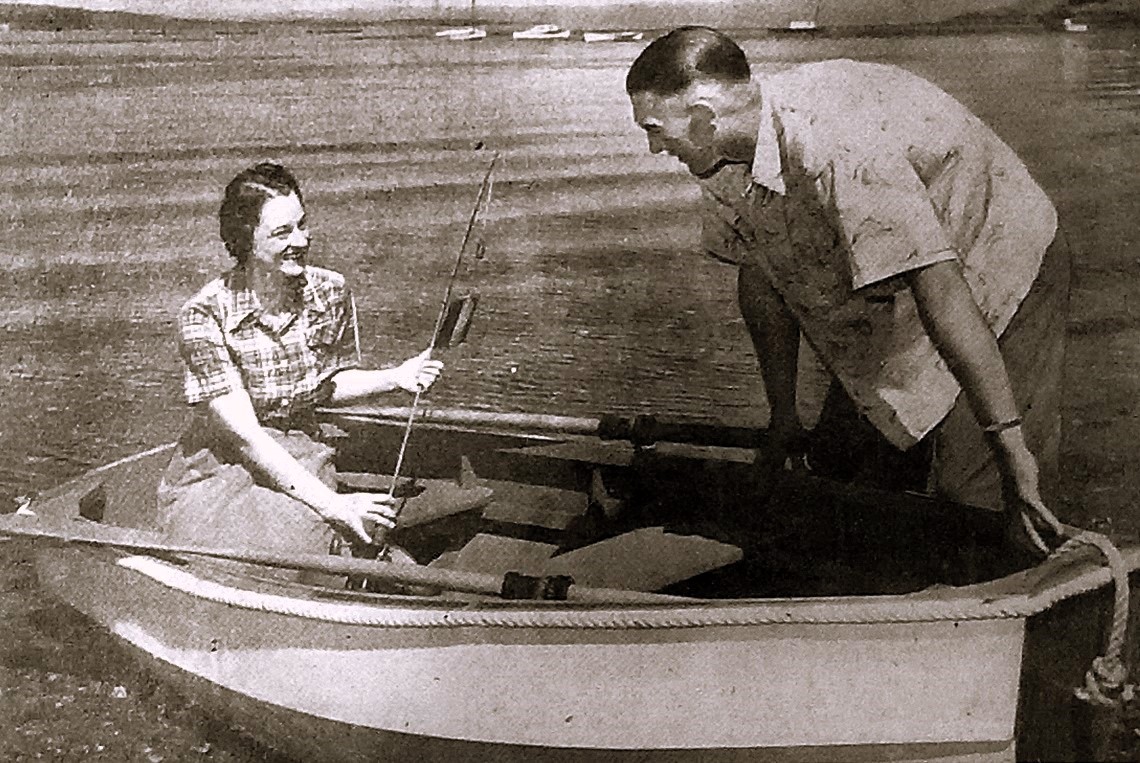
He and Hazel retired to a quiet life of woodworking and fishing and Sunday family suppers and summers on Orcas Island. Supporting the Green Lake Rowing Club and impromptu reunions with former rowers was as close as Al would come to the sport that he helped define for four decades. “My grandparents didn’t live out loud,” says Rinda Ulbrickson. “They were always satisfied with a small life.”
But her grandfather, who passed away in 1980 after being inducted into the National Rowing, Washington Sports and Husky Halls of Fame, left a big legacy.
“Everybody recognizes that Al Ulbrickson was one of the greatest coaches in the history of the sport. And he was a coach of life as much as of rowing,” Cohen says. “But for us, it’s the influence he had on the program going forward.”
Callahan, the catalyst of contemporary Husky glory, views Ulbrickson as a progenitor of the program’s defining culture of hard work and humility, of individual sacrifice and shared endeavor.
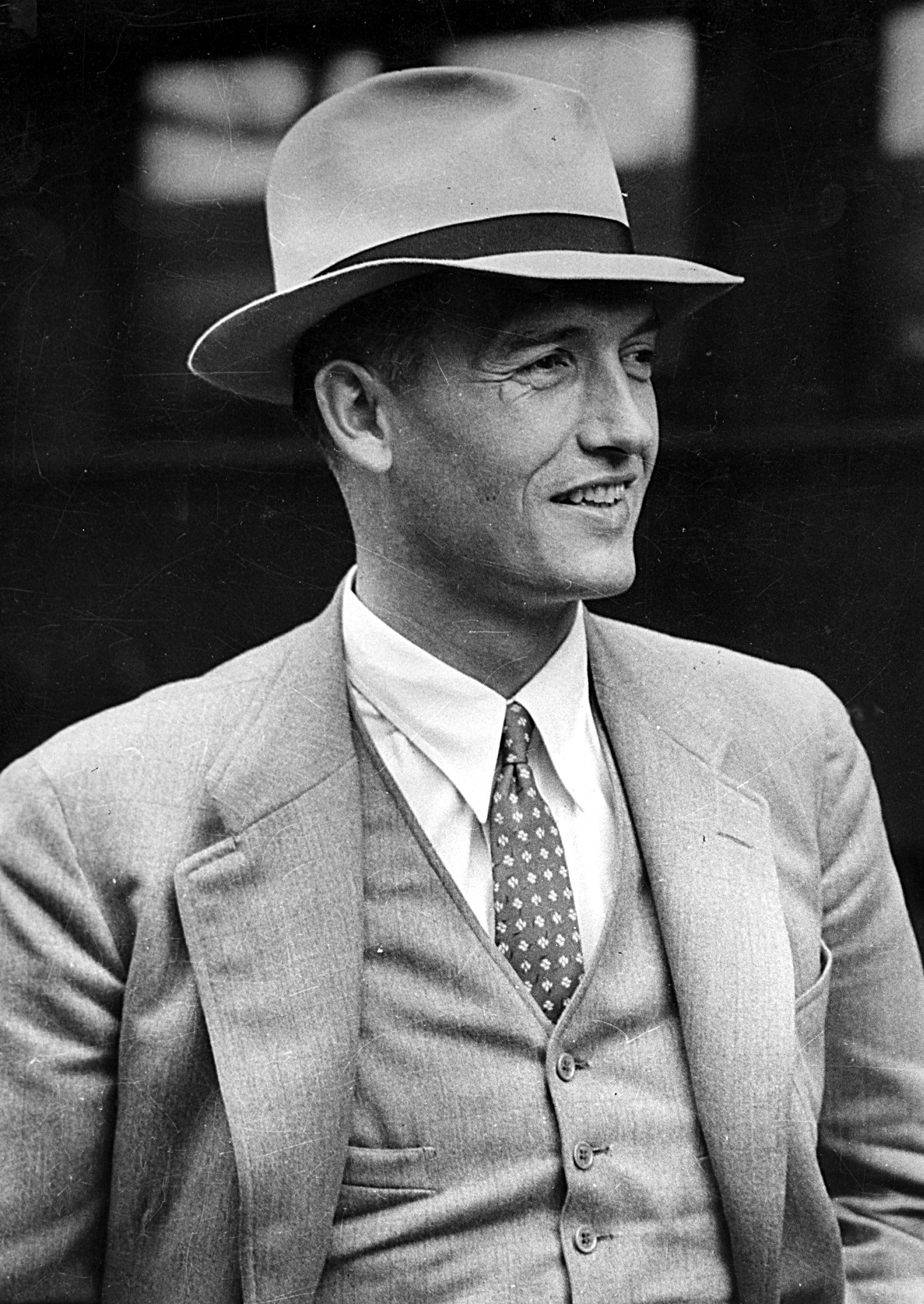 “These ethics have run from generation to generation to generation—on both the men’s and women’s side,” he says. “Al showed us that the most successful teams are the ones that row for each other. He was quiet, unassuming, but extremely competitive—the embodiment of the values that are foundational at Washington.”
“These ethics have run from generation to generation to generation—on both the men’s and women’s side,” he says. “Al showed us that the most successful teams are the ones that row for each other. He was quiet, unassuming, but extremely competitive—the embodiment of the values that are foundational at Washington.”
Callahan also admires the singular way in which Ulbrickson carried himself. “These days, everyone talks about personal branding and leaders are expected to be public and super charismatic,” he says. “Al showed a kind of quiet leadership that was more about the team than himself. It was never about him. That’s something I think a lot about. It was an incredible style of leadership that I think is undervalued these days.
“Al Ulbrickson was what I consider a true crew man. And what a presence! I look at the old photos of him and think, man, I need to get a suit and a fedora.”
